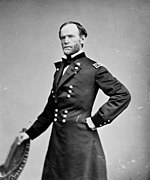How to Pronounce William Tecumseh Sherman
#50
Most Popular
Boost
Feb 08, 1820 John Sherman Birthplace, Ohio, United States Died on 14 Feb 1891 (aged 71)
American General, businessman, educator, and author
AquariusWilliam Tecumseh Sherman, Date of Birth, Place of Birth, Family, Facts, Age, Net Worth, Biography and More in FamedBorn.com

American General, businessman, educator, and author
Aquarius